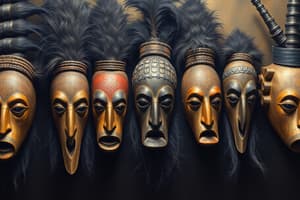Podcast
Questions and Answers
Traditions only exist at an individual level.
Traditions only exist at an individual level.
False (B)
Chinese New Year festivities symbolize darkness over light.
Chinese New Year festivities symbolize darkness over light.
False (B)
Eid al-Adha in Muslim cultures commemorates Abraham's willingness to sacrifice his son Isaac.
Eid al-Adha in Muslim cultures commemorates Abraham's willingness to sacrifice his son Isaac.
False (B)
Traditions can be broadly categorized into religious practices, social customs, and calendar events.
Traditions can be broadly categorized into religious practices, social customs, and calendar events.
Cultural traditions serve as linkages that divide people rather than bind them together.
Cultural traditions serve as linkages that divide people rather than bind them together.
The Haka dance is performed by the Maoris of New Zealand during their sports events to celebrate unity and respect for ancestors.
The Haka dance is performed by the Maoris of New Zealand during their sports events to celebrate unity and respect for ancestors.
Diwali celebrations in South Asia include displays of lights, colorful garments, and fireworks to strengthen social bonds between friends and families.
Diwali celebrations in South Asia include displays of lights, colorful garments, and fireworks to strengthen social bonds between friends and families.
Musical expressions have had a significant impact on societies throughout history, influencing emotions and identities.
Musical expressions have had a significant impact on societies throughout history, influencing emotions and identities.
Traditional customs, food, and music play separate roles in fostering cross-cultural appreciation.
Traditional customs, food, and music play separate roles in fostering cross-cultural appreciation.
The flamenco guitar strings played passionately in Spain are associated with the country's gypsy origins.
The flamenco guitar strings played passionately in Spain are associated with the country's gypsy origins.
Flashcards are hidden until you start studying
Study Notes
Exploring Cultural Traditions
Cultural traditions hold a unique place within societies worldwide, shaping our values, beliefs, and behaviors across generations. These practices carry deep roots of heritage, identity, and connection, helping us understand who we are while fostering empathy and respect towards others. Let's delve into some essential aspects of cultural traditions as they intertwine with broader culture.
Defining Cultural Traditions
A tradition is typically defined as a belief, behavior, or ritual passed down through time from one generation to another, often providing continuity between past and present. In essence, it serves as a thread connecting various facets of society—history, religion, arts, music, food, dress, celebrations, and more. Each tradition carries meaning beyond its apparent form, reinforcing collectively shared norms and unspoken rules essential to maintaining social cohesion and preserving cultural identities.
Why Traditions Matter
Traditions play a crucial role in solidifying group bonds, nurturing feelings of belongingness, and instilling a sense of purpose among members of a community. They serve as pathways to perpetuate memories and histories, honor ancestors, and express gratitude. Moreover, these customs help shape individual character traits such as responsibility, resilience, emotional maturity, and problem-solving skills–qualities integral to personal development.
At the societal level, traditions foster a collective understanding of the world around us, offering frameworks that allow individuals to align their actions and thoughts with those of their peers. They also serve as sources of inspiration; artisans may draw upon traditional techniques when creating new works, writers might find muses in historical narratives, musicians could derive melodies from ancient songs--all the while contributing to contemporary cultural expressions.
Examples and Diversity of Traditions
Cultures worldwide exhibit diverse arrays of traditions tailored according to their contexts, backgrounds, and life experiences. For instance, the Chinese New Year festivities brimming with firecrackers, dragons, lanterns, red envelopes, and community feasts are intended to bring fortune, prosperity, and unity, whereas Diwali in India symbolizes light over darkness, knowledge over ignorance, good over evil, and hope over despair via rituals like diya lighting, family gatherings, and lavish displays of decorations. Similarly, Eid al-Adha in Muslim cultures commemorates Abraham's willingness to sacrifice his son Ishmael by sacrificing animals as reminders of God's mercy and faithfulness.
Based on their origins and significance, traditions can broadly be categorized as follows:
- Religious practices: Rituals aimed at worshipping deities or seeking divine blessings, including prayer sessions, ceremonial processions and dance performances, fasting periods, pilgrimage trips, etc..
- Social customs: Nonreligious observances aiming to reinforce social relationships, enhance cooperation and collaboration, promote harmony and peace, and facilitate communication, such as greetings, handshakes, gift giving, marriage rites, funeral etiquettes, etc..
- Calendar events: Commemorating significant dates, occasions, achievements, anniversaries, holidays, birthdays, memorial days, etc., thereby upholding national pride, honoring heroes, acknowledging accomplishments, remembering tragedies, promoting education, establishing work ethics, encouraging charity, spreading joy, fostering fraternity, etc.
In conclusion, cultural traditions convey the quintessence of human civilization, serving as powerful linkages that bind people together and preserve valuable legacies handed down from previous generations. By appreciating, upholding, and sharing these customs, communities cultivate deeper connections, sow the seeds of mutual understanding, and continue their journey towards achieving global harmony grounded in a profound respect for diversity.
Studying That Suits You
Use AI to generate personalized quizzes and flashcards to suit your learning preferences.




